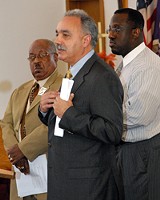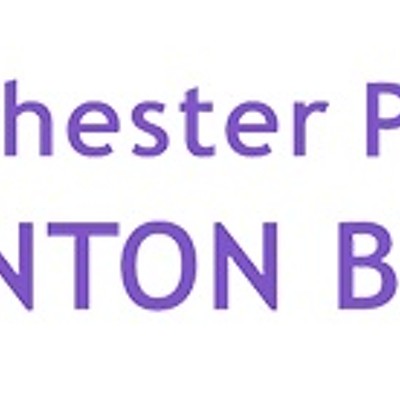[
{
"name": "500x250 Ad",
"insertPoint": "5",
"component": "15667920",
"parentWrapperClass": "",
"requiredCountToDisplay": "1"
}
]
Education
District, critics disagree on racism review
A review of employee complaints did not find evidence of racial discrimination in hiring and promotions, as some employees have charged, School Superintendent Manuel Rivera said at a press conference last week. Instead, Rivera said, the problems related to those particular employees stemmed from poor communication by the school district.
But that hasn't satisfied some of the critics who had pressed for action. Following the press conference, a citizen's group called the Parent and Community Advisory Committee charged that the review process was "fundamentally flawed." In a prepared statement to the media, the committee complained that it had not been part of the review process and didn't participate in decisions about employees who should be compensated.
And while members of an African-American clergy group seemed to support the review findings at the press conference, early this week one of the leaders was more critical.
In interviews after the press conference, the Rev. Willie Harvey had said the district was moving in the right direction. "We know everyone is not happy with it," Harvey said. But on Monday, Harvey strengthened his words. A joint statement by Rivera and the Clergy Review Board's chairperson, the Rev. Marlowe Washington, had called the review a "win-win." That, Harvey said, was "a lie."
"We all know that racism played a role in this," Harvey said. "Manny knows discrimination is going on in the district."
The review followed months of protests by African-American clergy and by 27 district employees who said they had been demoted, fired, or denied promotions as a result of racial discrimination. After discussions between Rivera and the clergy, Rivera established a five-member panel to review the employees' complaints. Three were district employees and two were non-employees who were recommended by the Clergy Review Board.
Rivera and the clergy presented the panel's findings at the press conference. School district officials declined to release the report, saying it contained confidential information about the employees, who had been assured that it would not be made public.
Nine of the 27 employees will receive some form of compensation, Rivera said. That could include "anything from title adjustments to reinstatement of their positions to other types of remedies that I will advance," Rivera said.
The compensation will be handled case by case with each of the nine employees, Rivera said. No compensation is being offered to the other employees.
The conflict between the district and the employees is a common one --- in government or in the private sector --- when one person is chosen over another for a job or a promotion. Were qualifications the reason? Or was it favoritism? Or racism?
School district employees do have a variety of ways to seek help when they believe they've been discriminated against. They can complain to their supervisor. They can ask their union to pursue their complaint. They can file a complaint with the federal Equal Opportunity Commission or the New York State Division of Human Rights. But as in many employment conflicts, district employees may be reluctant to talk with their supervisor, particularly if the supervisor is involved in the dispute. They may fear retaliation. And they may be intimidated by the prospect of filing complaints with government agencies.
In several community meetings called during the fall by the Rev. Harvey, district employees were asked to put their complaints in writing. To investigate those complaints, Rivera and the clergy then organized a unique review process: the appointment of the review panel.
The panel was led by Rivera's chief of staff, Kim Dyce-Faucette. Other members were Michele Hancock, the district's director of leadership and diversity development; two members of the district's human-resource staff, and the two women not associated with the district, Deidra Clifton-Goolsby and Joyce House. All five are African American.
Clifton-Goolsby and House were appointed "as objective parties," House said in an interview late last week. "We had no upfront information on any of these people or what their complaint was about until we read them. We've never been to any of their church meetings."
The five panel members read each complaint and met with 22 of the 27 employees individually. Four others decided not to go through the process, and a fifth couldn't be contacted. Clifton-Goolsby and House were the only two allowed to ask the employees questions. After each day of interviews, the panel debriefed.
"We were there to pull the facts out of each case," says House. "Were you allowed due process? Who represented you in your complaint? What happened to these people? That was our objective."
They looked for patterns and trends in the complaints, says House, to see if employees shared common experiences. The panel's feedback was given to Rivera with a set of recommendations to help prevent future problems. The most important, says House, was to improve communication with current and potential employees, particularly on job vacancies and promotions.
According to Rivera's summary of the report, some employees said they hadn't been informed about job openings that could have offered a promotion for them. Some said that they had applied for jobs but didn't get a response. Some said that feedback about their performance "was inconsistent, not clear, too infrequent, and sometimes not helpful."
"I do not recall any of these people bringing any accusations of racism to their complaints," says House. "No person said, 'I applied for that job, and a white person got it.' I understand that some people may have different perceptions, but going by the complaints, the facts are, No; it was not about racism. And I think one important thing that people fail to recognize is that the complaints came from the employees in their own words. They hand-wrote them or used a computer. They did not come from the district. There was no screening."
At the press conference, Rivera outlined steps he wants the district to take to improve communication with employees. They include doing a better job distributing information about job openings and responding to people who apply for jobs, being clearer about the district's selection process, reviewing the district's mentoring program, and strengthening its leadership training programs.
He will also ask the School Board to create an ombudsman office.
But members of the Parent and Community Advisory Committee aren't satisfied with the outcome. "We see this as a much bigger problem than the jobs of some district employees," says Diane Jackson, spokesperson for the Parent and Community Advisory Committee. "This does not address the serious problem of institutional racism in the district. And what message is this sending to our children? This whole process is for our children. If I as an educator am being treated this way, what is the future going to be like for our children? They are the ones really being hurt here."
Committee member Princess ReffellCont-eh talked in even broader terms. "Just look at what is happening, the killing in the streets," she says. "Why are our kids dying? It's because of what is happening in our schools. This racism is trickling down to them."
Van White, an attorney who has represented some district employees in action against the school district --- and who will become a member of the School Board in January --- says he too was disappointed in Rivera's response.
"I think it would have been better if Manny had just said, 'Yes, there is racism in the district,'" says White.
It's clear that the review doesn't bring an end to the issue, and there's some disagreement within the African-American community. On Monday, the Rev. Willie Harvey said the Clergy Review Board and the Parent and Community Advisory Committee had met after the press conference to discuss their differences. The two groups will continue to act as oversight groups to the district, he said. And it seems clear that the Parent and Community Advisory Committee wants to widen its probe of institutional racism in the district.
The Rev. Marlowe Washington, who is pastor of the Baber African Methodist Episcopal Church and chairs the Clergy Review Board, was more cautious. He said on Tuesday that he agrees that there is institutional racism within the district. "There is institutional racism wherever human beings reside," he said.
But, he added, after the review of "the 27 brave employees who gave their written complaints," the panel "did not find racism based on the statements of these employees."
"I am very much in opposition to any group that calls out racism with nothing to back it up," he said.
Speaking of Rochester School District, racism In Hiring
-

Urban Action 8/14
Aug 14, 2019 -

In the RCSD-city fight, the children are losing
Jul 30, 2019 -

There's no one 'fix' for the RCSD's problems
Jun 18, 2019 - More »
Latest in News
More by Tim Louis Macaluso
-

RCSD financial crisis builds
Sep 23, 2019 -

RCSD facing spending concerns
Sep 20, 2019 -

Education forum tomorrow night for downtown residents
Sep 17, 2019 - More »






